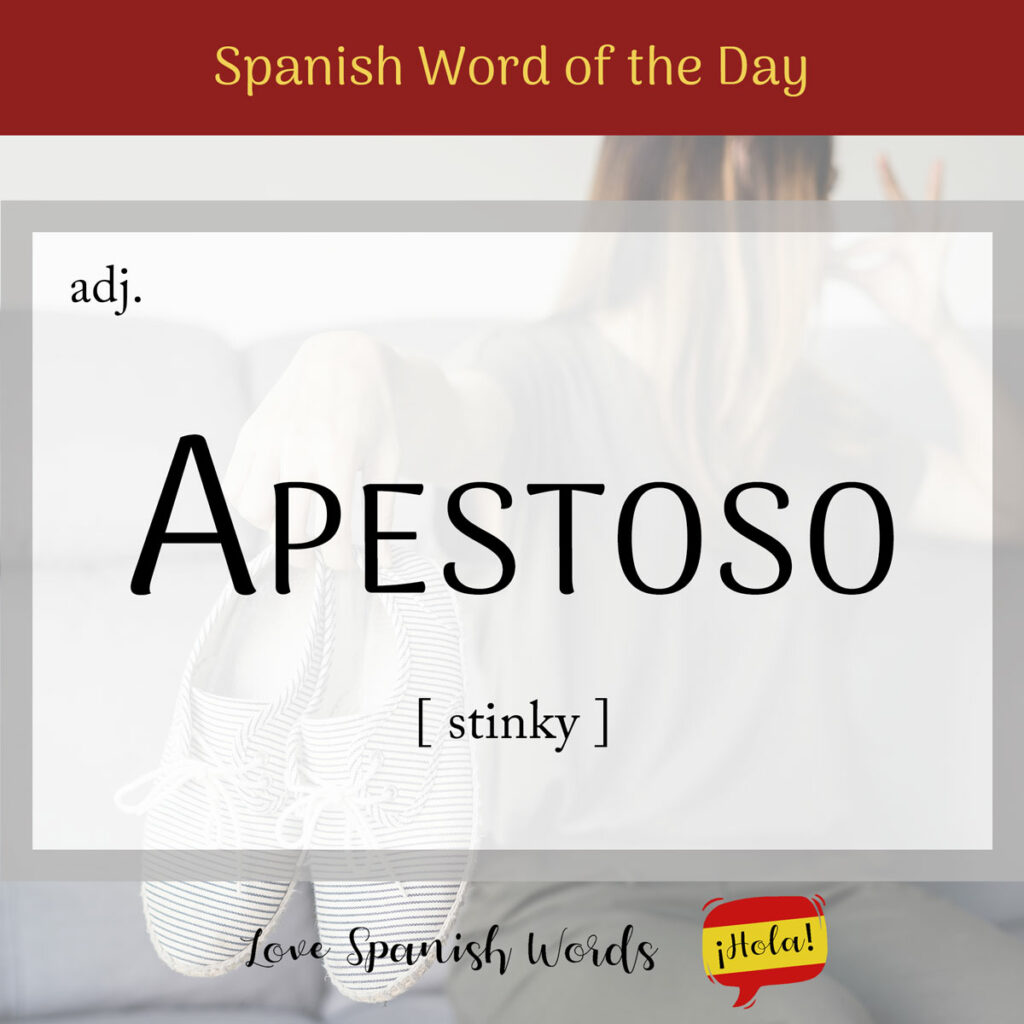The Spanish word apestoso (stinky) is an adjective used to describe an unpleasant smell. It comes from the Latin verb appestare, which means to cause a smell. The Spanish equivalent of the verb is apestar (to smell).
Latin American Pronunciation
European Pronunciation

The adjective changes depending on the object it’s describing. It becomes apestoso to describe a masculine noun and apestosa to describe a feminine noun. Examples:
- La basura apestosa casi me hace vomitar. = The stinky trash almost made me vomit.
- El zapato apestoso esta tirado en el piso. = The stinky shoe is thrown on the floor.
El refrigerador tiene un olor apestoso por la comida podrida.
The refrigerator has a stinky smell from rotten food.
The words apestoso and apestosa can be used both literally and figuratively. Figuratively, it describes a person who is an annoying pest who causes problems. It also describes a situation or place that’s unpleasant.
Example: Este bar esta apestoso, mejor vayamos a otro. (This bar stinks, let’s go to another one instead.)
In this sentence, it refers to the place being unpleasant rather than stinky due to a bad smell.
Vayámonos de esta fiesta, está apestosa.
Let’s leave this party, it stinks.
Some common words that use apestoso/a include:
- basurero apestoso = stinky trash
- comida apestosa = stinky food
- cuarto apestoso = stinky room
- perro apestoso = stinky dog
- baño apestoso = stinky bathroom
- aliento apestoso = stinky breath
- ropa apestosa = stinky clothes
Because the adjective apestoso comes from the verb apestar, you’ll sometimes hear both words used to describe something, but with slightly different meanings. Let’s explore the difference:
- Este cuarto apesta. (verb) = This room smells.
- Este cuarto esta apestoso. (adjective) = This room is stinky.
The first sentence describes what the room is doing: it smells of something. The second sentence describes the room as being smelly. Let’s look at another example:
- El perro apesta a gasolina. (verb) = The dog smells like gasoline.
- El perro apestoso huele a gasolina. (adjective) = The stinky dog reeks of gasoline.
Again, the first sentence describes what the dog is doing: it smells like gasoline. The second sentence describes the dog as being stinky.
Some synonyms for apestoso include: maloliente (smelly), hediondo (smelly), and pestilente (pestilential).
El aire estaba apestoso a humo del incendio.
The air reeked of smoke from the fire.

Spanish colloquial and idiomatic expressions featuring ‘apestoso/a’
Two popular Spanish expressions that do not use the word apestoso, but refer to the unpleasantness of a smell, are the following:
- Huele a rayos. = It smells like lightning.
- Huele a mierda. = It smells like shit.
In Spanish, the expression “¡fo!” is used to express disgust, especially in response to a bad smell. This interjection is onomatopoeic, meaning it imitates the spontaneous sound or reaction people often make when they encounter something unpleasant, like a strong and offensive odor. Similar to how ew or yuck is used in English, ¡fo! is a natural reaction that has become a common expression in everyday language.
These interjections are not only used in the context of bad smells but can also be applied to any situation that causes disgust or repulsion.
Estar apestoso a algo
Literal translation: to smell like something
English meaning: to have a strong smell of something in particular
Oler apestoso
Literal translation: to smell stinky
English meaning: to smell bad (to describe a place or situation that’s seen as negative, not just the smell, but because of the general atmosphere)
Echar un apestoso
Literal translation: to throw a stinker
English meaning: to produce a stinky smell (such as a fart)
Ser un apestoso/a
Literal translation: to be stinky
English meaning: to be a pest or cause problems (used figuratively to describe an unpleasant person)

